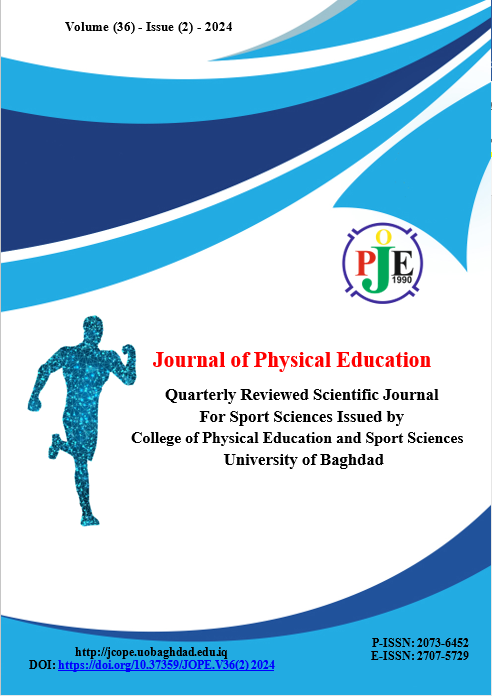Empowering leadership of directors of sports and school activity departments in Baghdad Governorate and its impact on organizational control from the point of view of its employees
DOI:
https://doi.org/10.37359/JOPE.V36(2)2024.2018Keywords:
Empowerment Leadership, Organizational Control, Sports and School Activity SectionsAbstract
Leadership of organizations is one of the most important factors influencing their success and sustainability, which includes managers assuming responsibility for directing and managing human and material resources, defining the vision and mission, and developing the necessary strategies to achieve their goals. It also includes organizing and motivating teams and making critical decisions. As well as supervising administrative processes and activities. Daily and ensure its effective operation, the research aimed to determine the extent to which directors of sports and school activity departments in Iraq apply empowering leadership, and determine the level of organizational control in sports and school activity departments in Iraq from the point of view of their employees, as well as determining the nature of the relationship. The impact of the empowering leadership of the directors of sports and school activity departments on their organizational control. In order to collect data, the researcher used the descriptive method using the survey method and the correlational method. The research community was determined by the employees of the sports and school activity departments in the education directorates in Baghdad Governorate, who number (245). employees, when they were all selected to form the main research sample, and then the researcher divided them into three subgroups: the survey sample, which includes (15) employees, the statistical analysis sample, which includes (138) employees, and the final application sample, which includes (92) employees. To obtain the required data, the researcher by preparing two tools, the first is the empowering leadership tool, which has (14) items, and the organizational control tool, which has (12) items. They are answered with five-point answer alternatives, which are (it applies a lot, it applies, it applies somewhat, it does not apply, it does not apply very much), which the weights are carried (5-4-3-2-1) respectively, and after analyzing the data statistically, the following conclusions were reached:
- Directors of sports and school activity departments in Baghdad Governorate apply empowering leadership practices at an average level from the point of view of their employees.
- The sports and school activity departments in Baghdad Governorate have an average level of organizational control from the point of view of their employees.
- The relationship between empowering leadership among directors of sports and school activity departments and organizational control in these departments is positive, with an impact of empowering leadership on organizational control
References
Ahmed Fadhil Farhan Mohammed Jawad Kadhim, G. M. S. (2016). THE EFFECTIVENESS OF INJURY PREVENTION PROGRAM ON REDUCING THE INCIDENCE OF LOWER LIMB INJURIES IN ADOLESCENT MALE SOCCER PLAYERS. Injury Prevention, 22(Suppl 2, 346. https://www.proquest.com/openview/fd995719bc359d2e05fa6fe346bed0f6/1?pq-origsite=gscholar&cbl=2031963
Al-Mansi, M. A. (2022). The relationship between Empowering Leadership and innovative behavior at work, the mediating role of job modification and perceived social support (an applied study on workers in commercial banks in Dahkalia Governorate). Scientific Journal of Business Reresearch (Menoufia University), Vol. 47(No. 4), 53–106.
Conides, A. (2019). Empowering Leadership and Employee Motivation, Behaviors, and Well-Being: Enabling or Burdening? Concordia University, Montreal, Quebec, Canada.
Dekker, H., Donada, C., Mothe, C., & Nogatchewsky, G. (2019). Boundary spanner relational behavior and inter-organizational control in supply chain relationships. Industrial Marketing Management, 77(November), 143–154. https://doi.org/10.1016/j.indmarman.2018.11.010
Easa, F. A. W., Shihab, G. M., & Kadhim, M. J. (2022). the Effect of Training Network Training in Two Ways, High Interval Training and Repetition To Develop Speed Endurance Adapt Heart Rate and Achieve 5000 Meters Youth. Revista Iberoamericana de Psicologia Del Ejercicio y El Deporte, 17(4), 239–241.
Fadel, G. A., & Kadem, M. J. (2021). Youth and Sports Forums’ Administration and Their Relationship with Baghdad’s Youth and Sport Directorates Forum Organizational Culture from Workers’ Point of View. Journal of Physical Education, 33(3), 1–15. https://doi.org/10.37359/jope.v33(3)2021.1182
jawad kadhim, M., & Mahmood, H. (2023). The effect of special exercises for some physical, motor and electrical abilities accompanied by symmetrical electrical stimulation in the rehabilitation of the muscles of the arms of patients with simple hemiplegic cerebral palsy. Journal of Physical Education, 35(3), 618–593. https://doi.org/10.37359/JOPE.V35(3)2023.1515
Kadhim, M. J., Shihab, G. M., & Zaqair, A. L. A. A. (2021). The Effect of Using Fast And Direct Cooling after Physical Effort on Some Physiological Variables of Advanced Football Players. Annals of the Romanian Society for Cell Biology, 25(6), 10014–10020. https://annalsofrscb.ro/index.php/journal/article/view/7336
Kadhim, M. J. (2023a). Evaluation Of The Existence Of Gender Disparities In Iraq. International Journal of Social Trends, 1(1), 10–16.
Kadhim, M. J. (2023b). Examining The Relationship Between Social Classes And The Culture Of Poverty : A Case Study. International Journal of Social Trends, 1(1), 23–27.
Kim, M., & Beehr, T. A. (2020a). Empowering leadership: leading people to be present through affective organizational commitment?*. International Journal of Human Resource Management, 31(16), 2017–2044. https://doi.org/10.1080/09585192.2018.1424017
Kim, M., & Beehr, T. A. (2020b). Empowering leadership: leading people to be present through affective organizational commitment? The International Journal of Human Resource Management, 31(16), 2017–2044. https://doi.org/10.1080/09585192.2018.1424017
Moe, N. B., Šmite, D., Paasivaara, M., & Lassenius, C. (2021). Finding the sweet spot for organizational control and team autonomy in large-scale agile software development. Empirical Software Engineering, 26(5), 101. https://doi.org/10.1007/s10664-021-09967-3
Norlander, P., Jukic, N., Varma, A., & Nestorov, S. (2021). The effects of technological supervision on gig workers: organizational control and motivation of Uber, taxi, and limousine drivers. The International Journal of Human Resource Management, 32(19), 4053–4077. https://doi.org/10.1080/09585192.2020.1867614
Pianese, T., Errichiello, L., & da Cunha, J. V. (2023). Organizational control in the context of remote working: A synthesis of empirical findings and a research agenda. European Management Review, 20(2), 326–345. https://doi.org/10.1111/emre.12515
Rauter, R., Globocnik, D., & Baumgartner, R. J. (2023). The role of organizational controls to advance sustainability innovation performance. Technovation, 128(March 2022), 102855. https://doi.org/10.1016/j.technovation.2023.102855
Salman, S. M., Kadhim, M. J., & Shihab, G. M. (2022). The effect of special exercises in the rehabilitation of the shoulder muscle for the youth wrestling category. INTERNATIONAL JOURNAL OF EARLY CHILDHOOD SPECIAL EDUCATION, 14(5), 4606–4609. https://doi.org/10.9756/INTJECSE/V14I5.555
Sihag, V., & Rijsdijk, S. A. (2019). Organizational Controls and Performance Outcomes: A Meta‐Analytic Assessment and Extension. Journal of Management Studies, 56(1), 91–133. https://doi.org/10.1111/joms.12342
Tian, X., & Chae, H. (2023). The Double-Sided Effect of Empowering Leadership on Constructive Voice Behavior: Focusing on the Mediating Effects of Task Significance and Task Overload. Behavioral Sciences, 13(2), 180. https://doi.org/10.3390/bs13020180
Utami, V. P., & Zakiy, M. (2020). THE EFFECT OF EMPOWERING LEADERSHIP ON INTRINSIC MOTIVATION: THE ROLE OF PSYCHOLOGICAL EMPOWERMENT AS A MEDIATION. Journal of Leadership in Organizations, 2(2). https://doi.org/10.22146/jlo.58032
Verburg, R. M., Nienaber, A.-M., Searle, R. H., Weibel, A., Den Hartog, D. N., & Rupp, D. E. (2018). The Role of Organizational Control Systems in Employees’ Organizational Trust and Performance Outcomes. Group & Organization Management, 43(2), 179–206. https://doi.org/10.1177/1059601117725191
Vu, H. M. (2020). Employee empowerment and empowering leadership: A literature review. Technium: Romanian Journal of Applied Sciences and Technology, 2(7), 20–28. https://doi.org/10.47577/technium.v2i7.1653
Gharib, N., & Zaher, T. (2022). The impact of empowering leadership on promoting entrepreneurship in service organizations (a case study in Al-Assad University Hospital - Damascus). Hama University Journal, Vol. 5(Issue 22), 105–122.
Marzouk, A. A., Al-Ruby, M. F. M., & Al-Abbasi, E. M. (2021). The impact of empowering leadership on organizational citizenship behavior directed towards the organization: an applied study on local government units in Kafr El-Sheikh Governorate. Journal of Contemporary Business Studies, No. 3(December), 1–33.
Downloads
Published
Issue
Section
License
Copyright (c) 2024 Journal of Physical Education

This work is licensed under a Creative Commons Attribution-NonCommercial 4.0 International License.






 The Journal of Physical Education (JOPE) applies a Creative Commons Attribution 4.0 International license (CC BY 4.0), which lets others distribute, remix, tweak, and build upon your work, even commercially, as long as they credit you for the original creation. For more information, click the link :
The Journal of Physical Education (JOPE) applies a Creative Commons Attribution 4.0 International license (CC BY 4.0), which lets others distribute, remix, tweak, and build upon your work, even commercially, as long as they credit you for the original creation. For more information, click the link : 